Authors & editors
ANU Press has collaborated with a diverse range of authors and editors across a wide variety of academic disciplines. Browse the ANU Press collection by author or editor.
Yixiao Zhou »
Yixiao Zhou is Associate Professor of Economics and Director of China Economy Program, Crawford School of Public Policy, The Australian National University.
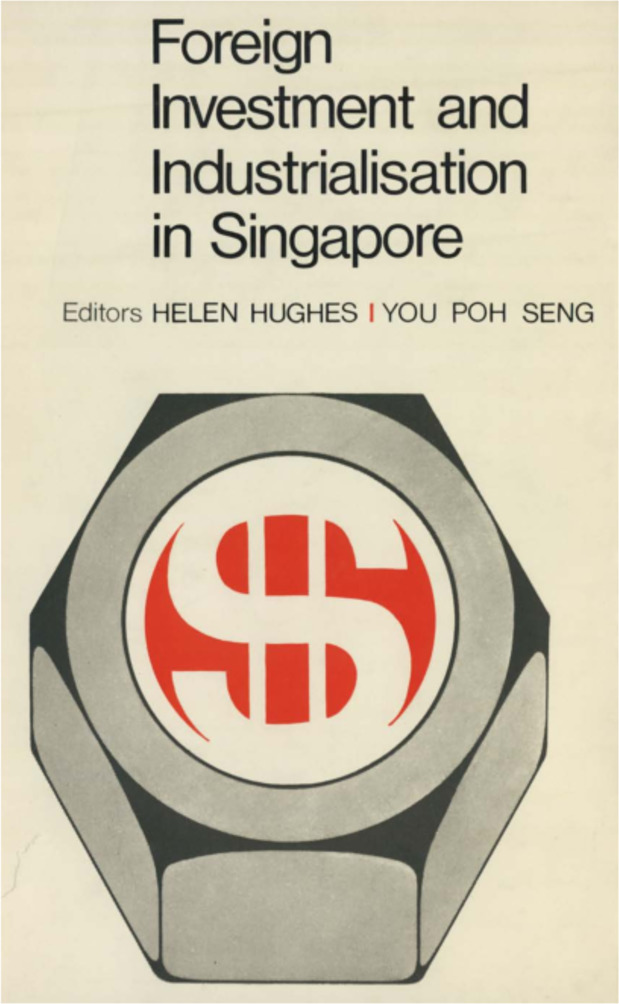
Foreign investment and industrialisation in Singapore »
Publication date: 1969
Singapore has faced extremely difficult economic conditions in the 1960s, and these will be exacerbated by the withdrawal of the United Kingdom military establishment during the next few years. Foreign investment can play an important role in Singapore's economy and at the same time make profits for the foreign investors. This book explores the problems involved. The aim of the surveys conducted by Dr Hughes and her colleagues during 1966 and 1967 was to see whether the incentives offered by Singapore to foreign investors were suitable and effective, to evaluate the contribution made by foreign investors to the development of manufacturing in Singapore, and to highlight the problems they faced. The most surprising finding of the book is that direct financial incentives to foreign investors are unnecessary. Singapore's principal attraction to outside investors lies in its efficient administration and the provision of public services, while its central geographic situation in Southeast Asia has to some extent offset the smallness of its internal market. The book will be of particular interest to two kinds of reader: manufacturers, administrators, and others concerned with investment in Southeast Asia, and economists everywhere who are studying the economic development of the area, the problems of establishing manufacturing industries in developing countries, and the economics of direct foreign investment.
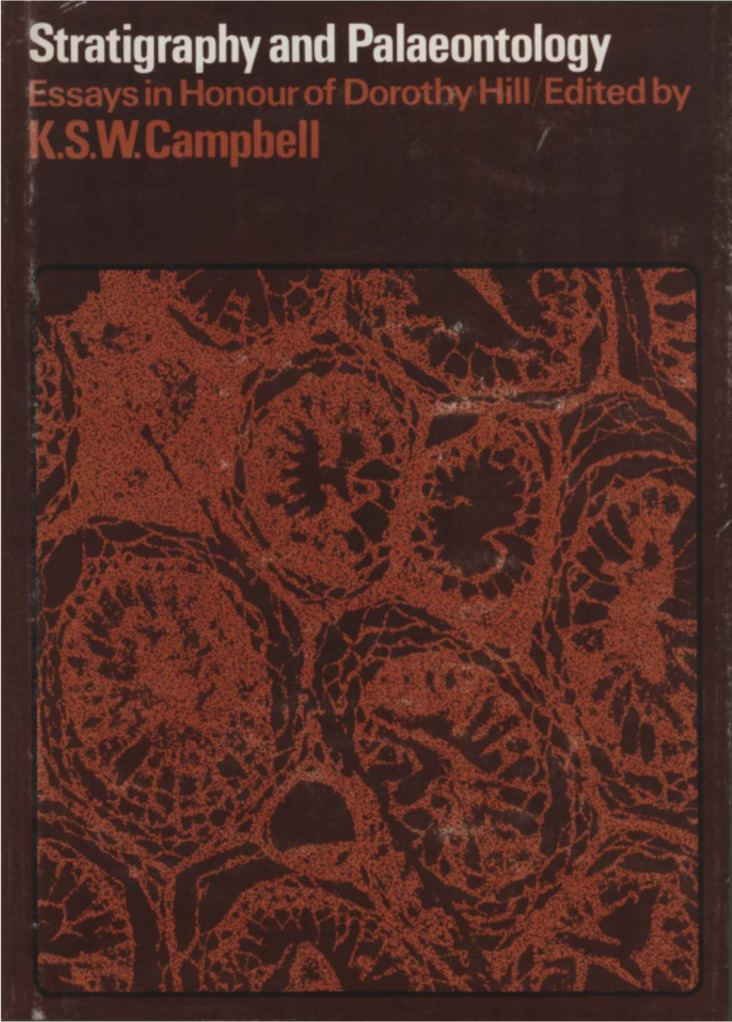
Stratigraphy and palaeontology: essays in honour of Dorothy Hill »
Publication date: 1969
Geology is Earth history. The twenty essays in this book are concerned primarily with illustrating this history by reference to four aspects of stratigraphy and palaeontology: the biological interpretation of fossils, biostratigraphy and biogeography, descriptive palaeontology, and marine sedimentation and geomorphology. The dictum that 'palaeontology is the handmaid of stratigraphy' - without stratigraphy palaeontology would lack a time reference - is a truism. Each, of course, elucidates the other. Not nearly so widely recognised, however, is the relationship of stratigraphy and palaeontology to other aspects of Earth history. Some of the essays in the book will interest biologists as well as geologists in the contribution that fossils make to understanding the problems of evolution, classification, functional morphology and ecology. The correlation of Australian Carboniferous, Permian, and Cretaceous rocks, generally valuable to stratigraphers and palaeontologists, is of particular importance for the economic exploitation of the rocks of the country. The biogeographic analysis of new palaeontological and stratigraphic data is pertinent for geophysicists, geologists, and geographers interested in the problem of continental drift; while by virtue of its geography and its geological record Australia must hold many of the keys for understanding southern hemisphere geology, and all Gondwana reconstructions will have to be checked against the detailed information now made available. Geologists, sedimentologists, and geomorphologists will find stimulating the discussions on the geomorphological development of south-east Queensland and on the Great Barrier Reef. The broad scope of this book, offering as it does essays on many new discoveries and revaluations of past work, will be of considerable value to a wide range of scholars in many disciplines. As such, it is a fitting tribute to the woman it is designed to honour, Professor Dorothy Hill, F.R.S.
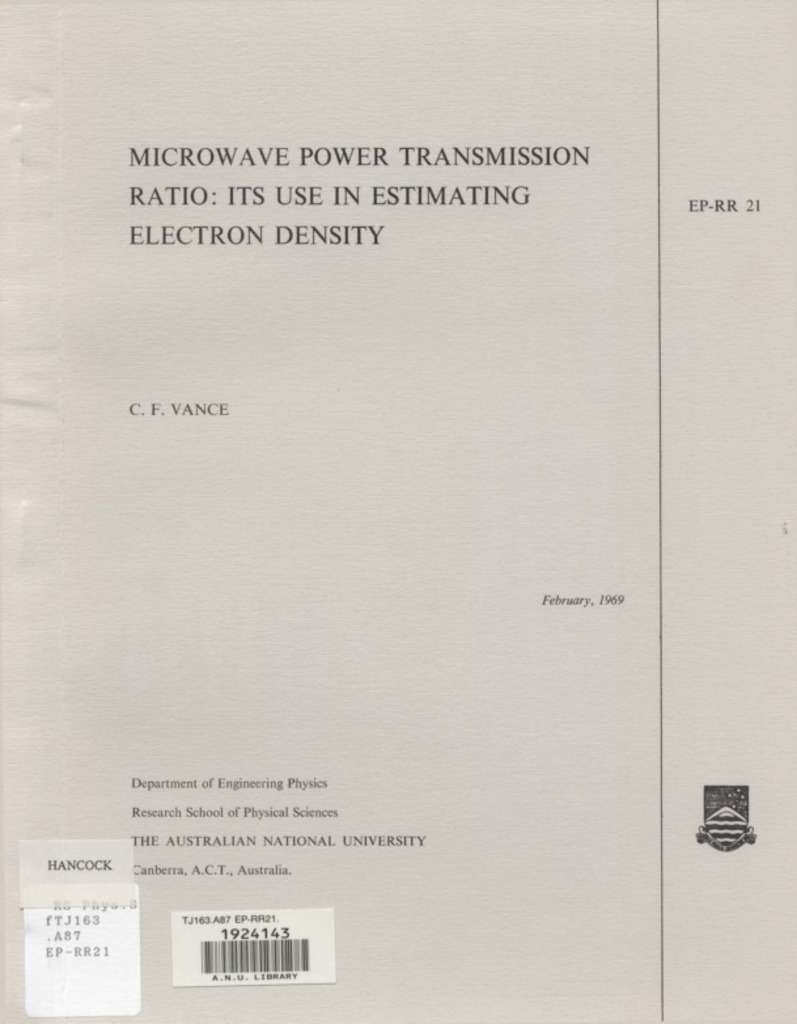
Microwave power transmission ratio: its use in estimating electron density »
Publication date: 1969
Published Press Archives http://press.anu.edu.au/node/3715 1885_114981.jpg ANU Press Microwave power transmission ratio: its use in estimating electron density Monday, 18 August, 1969 Not available Archive Scholarly Information Services Vance, Colin Francis
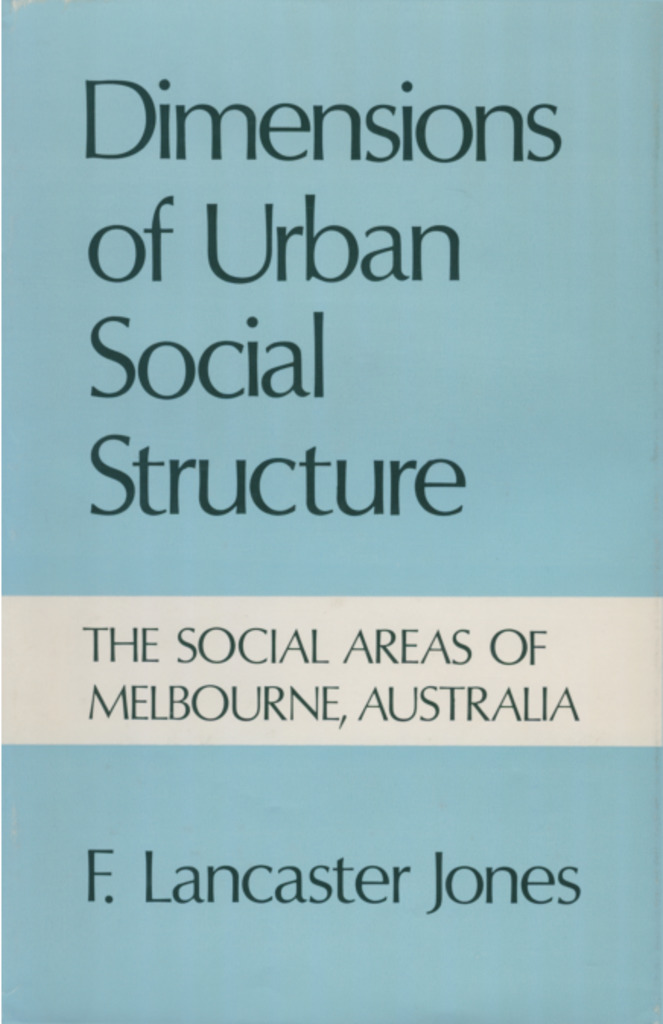
Dimensions of urban social structure: the social areas of Melbourne, Australia »
Publication date: 1969
The physical segregation of social groups in industrial cities has long attracted the attention of social scientist and casual observer alike. In Australia the possibility of mapping the social ecology of large cities has been limited by the absence of sufficiently detailed census information, a gap remedied in 1961 by the provision of a new range of small area data. Here the author exploits the existence of the new information to present the first intensive social anatomy of any Australian metropolis. Statistics on the residential concentration and segregation of seventy socioeconomic, demographic, ethnic, and religious categories are examined, and the vast complexity and range of these data are reduced by sophisticated techniques of statistical analysis to three theoretically meaningful constructs - social rank, familism, and ethnicity. These constructs are used to develop a typology of social areas which serves as the basis for developing an understanding of, and further hypotheses about, urban social structure. Not only does this analysis present a self-contained study of Australia{u2019}s second largest metropolis, but detailed maps and statistical appendixes provide a benchmark for future social investigations into the urban scene - on subjects such as political preference, immigrant adjustment, poverty, crime, delinquency, and urban planning.

Use of the homopolar generator to power xenon discharge tubes and some associated switching problems »
Publication date: 1969
Published Press Archives http://press.anu.edu.au/node/3065 1885_114979.jpg ANU Press Use of the homopolar generator to power xenon discharge tubes and some associated switching problems Monday, 18 August, 1969 Not available Archive Scholarly Information Services Inall, E. K
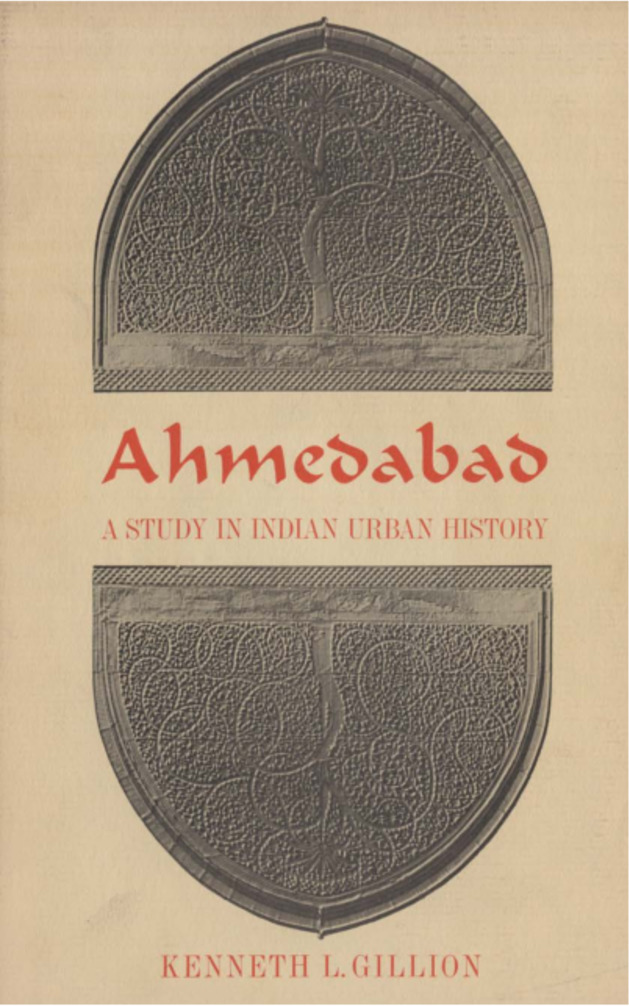
Ahmedabad: a study in Indian urban history »
Publication date: 1969
In what the author describes as a preliminary excursion into Indian urban history, he writes here not about Indian cities in general but about the unique experience of a particular city, Ahmedabad, the capital of Gujarat State in western India and for many years the home of Mahatma Gandhi and Sardar Patel. Ahmedabad, India's sixth city in size and one of the richest, was not a creation of British rule but an old center of trade and industry that adapted to the new age and became "The Manchester of India." Its recovery in the nineteenth century, after a decline in the previous one, contrasted with the experience of other Indian cities, many of which suffered a different fate under British rule. Ahmedabad provides an interesting qualification of many of the statements commonly made about Indian industrialization. Western influence and social change there were limited in the nineteenth century, and the early industrialization of the city was achieved within a society that remained socially and politically conservative. Modern Ahmedabad was the creation of Ahmedabadis, not of outsiders. In no other great city of India can the continuity of past and present be seen so clearly, and it is continuity rather than change that this book emphasizes. Mr. Gillion's account, focusing mainly on the century beginning with the British annexation in 1817, suggests a new way of viewing Indian social and economic history. Indirectly but none the less suggestively, this work reopens the whole question of westernization in India and places it in a fresh perspective.

The early history of Korea: the historical development of the Peninsula up the the introduction of Buddhism in the Fourth Century A.D. »
Publication date: 1969
Korean studies in Western universities have long been hampered by the absence of an adequate general history of Korea in any Western language. The earliest period of Korean history, up to the introduction of Buddhism late in the fourth century a.d., remains the worst served of any. This short history is intended as an attempt to remedy the situation. It is based mostly upon studies already carried out by Korean and Japanese scholars, and aims at making some of the results of their research available to Western students, particularly students of Chinese and Japanese history. Dr Gardiner writes about the background and history of Korea before the Han conquest in 108 b.c.; the structure and development of the Chinese colonies in Korea from 108 b.c. to the end of the third century a.d. ; the early history of Kogury{u014F} later one of the 'Three Kingdoms' of Korea; and finally about the conditions which produced so many changes in Korea in the fourth century A.D., including the beginning of Japanese intervention and the coming of Buddhism.
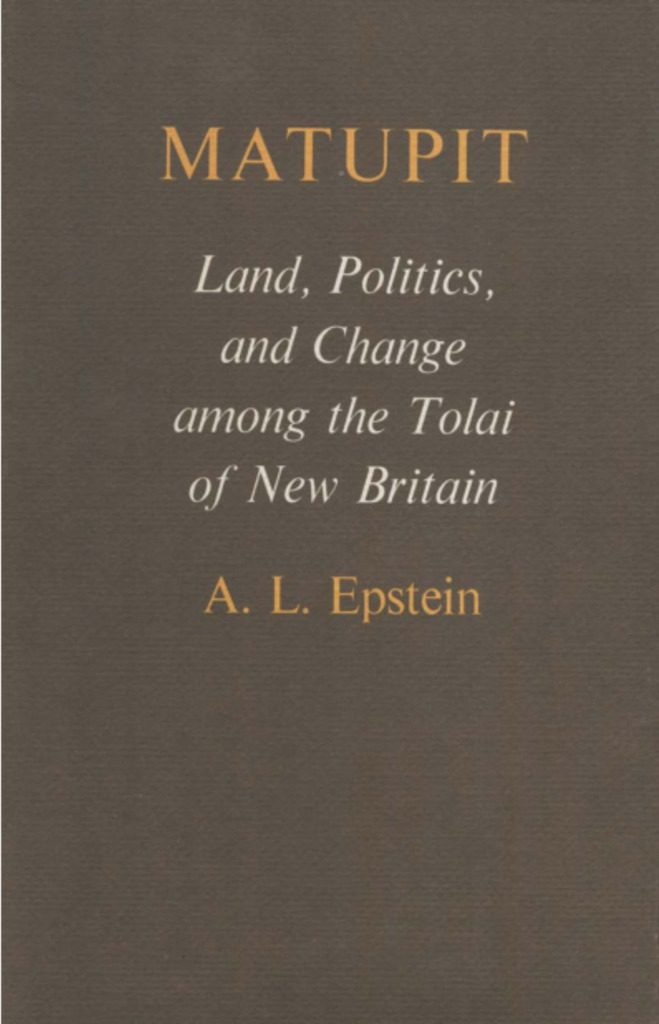
Matupit: land, politics and change among the Tolai of New Britain »
Publication date: 1969
One of the most interesting aspects of the study of change among a people after they have had contact with an alien civilisation is not only how they change but also how much they retain of their traditional ways - continuity in change. This book examines the question as exemplified by the Tolai people of Matupit, a small island near Rabaul. The Tolai of the north-eastern Gazelle Peninsula are among the most sophisticated and wealthy indigenous people of New Guinea and occupy a prominence in the affairs of Papua-New Guinea out of all proportion to their numbers. The Matupi are one of the largest groups of Tolai. Despite their sophistication and close links with Rabaul the Matupi retain many of their old traditions and, though they may work for wages in Rabaul, land is still extremely important to them, for most still grow much of their own food and cultivate cash crops. It is not surprising, therefore, that they devote much time and energy to disputes over land, and a major part of this book is an attempt to understand the nature of these disputes and the part that land plays in their lives. To understand this the author has examined in detail the modern political and economic systems of the island and illustrated his findings by case histories of the often involved disputes over land use and ownership which may go back several generations.
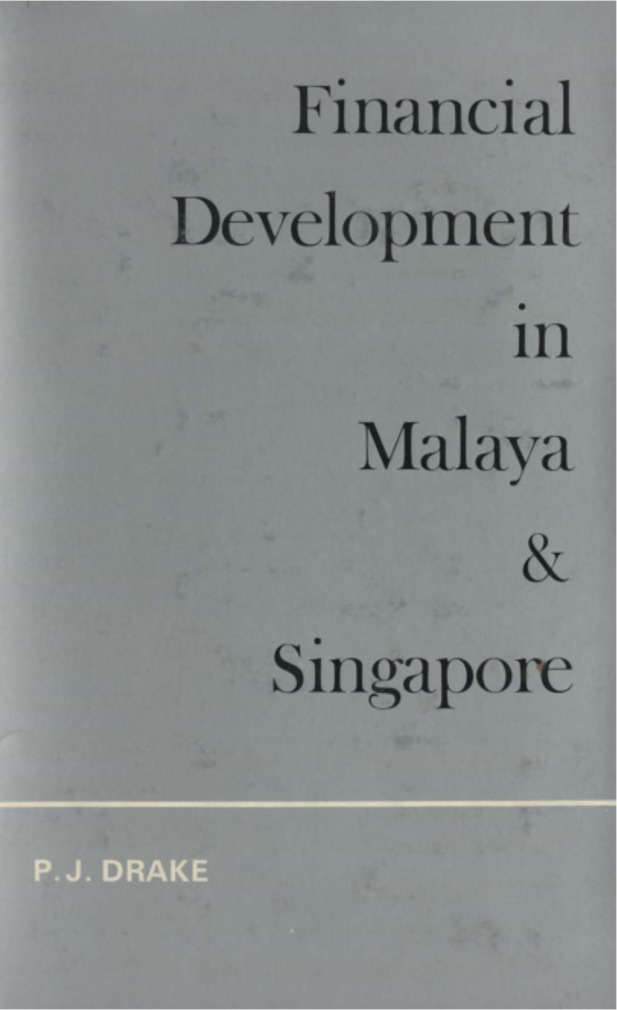
Financial development in Malaya and Singapore »
Publication date: 1969
This book describes and analyses the financial system in Malaya and Singapore as it had developed up to 1967, revealing, in particular, the transition from external domination to financial independence which has taken place in the last decade. While the work concentrates on the period after World War II, it also gives a complete account of historical events concerning the evolution of the system. This is the first up-to-date and comprehensive discussion of the financial problems of the Malayan region. Very little has been written on the subject since 1960 and earlier publications relate mainly to currency history and to the establishment of the Central Bank. The book deals thoroughly with currency arrangements, the commercial banking system, the Central Bank, financial enterprises other than banks, money and securities markets, and monetary and financial policy. It provides a full account of the many significant monetary and financial developments of the last decade and will be essential reading for students of economics in Malaysia and Singapore and for bankers and financiers in, and dealing with, that area. It will also be of great value to readers with interests in the fields of comparative banking and finance, economic development, and Malayan studies.
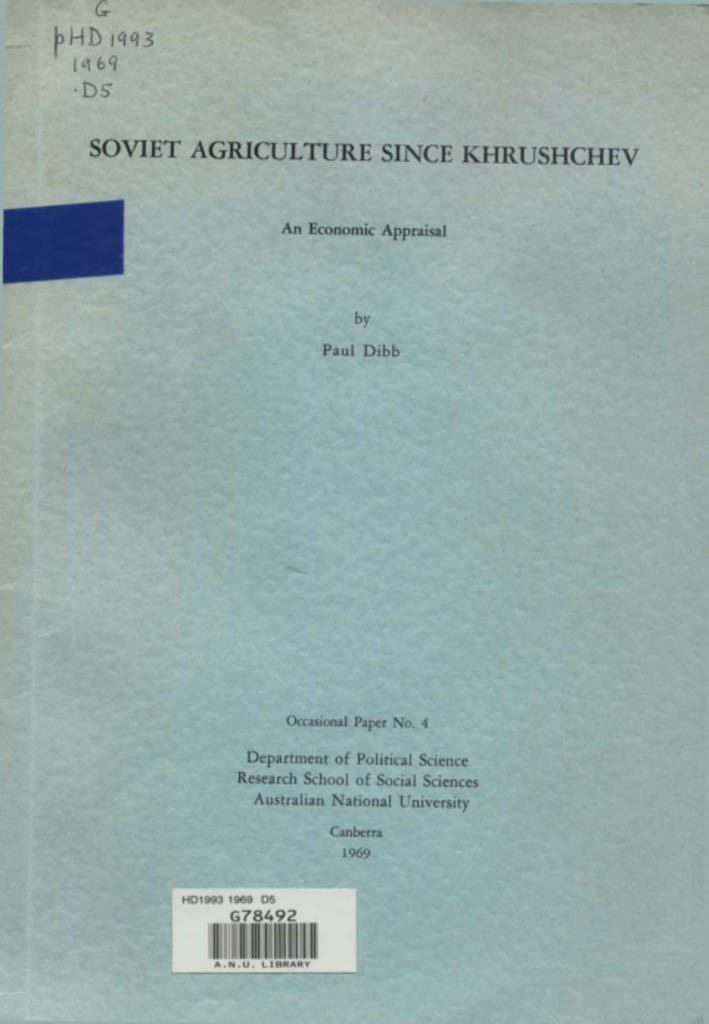
Soviet agriculture since Khrushchev: an economic appraisal »
Publication date: 1969
Published Press Archives http://press.anu.edu.au/node/3333 1885_115012.jpg ANU Press Soviet agriculture since Khrushchev: an economic appraisal Monday, 18 August, 1969 Not available Archive Scholarly Information Services Dibb, Paul

Landforms of cold climates »
Publication date: 1969
This is another volume in the series, An Introduction to Systematic Geomorphology. It is concerned with the landscapes produced where water exists commonly in solid form - as ground ice, as snow, or as glacial ice. Although the present distribution of glaciers, snowbanks, and frozen groundwater is relatively limited, these phenomena were much more extensively distributed during the Pleistocene ice ages and they have left their mark on the landscapes of almost all parts of the temperate world. It is impossible to understand the landscapes of much of southeastern Australia, New Zealand, Europe, and northern North America without taking into consideration the parts played by glacial and periglacial processes during the Pleistocene. Since World War II there has been a great upsurge of interest in the phenomena associate with ice sheets, the tundra lands, and high mountain areas. Much of the work carried out has been inspired by the difficulties of planning and executing engineering works in regions where snow and ice are prevalent, and some of the results of this recent work in the Arctic and Antarctic are incorporated in this volume. Well illustrated with half-tone plates, maps, and diagrams, Landforms of Cold Climates has been designed particularly for schools and universities, but should interest a much wider audience.

Pivoted hydrostatic bearing pads for the Canberra homo-polar generator »
Publication date: 1969
Published Press Archives http://press.anu.edu.au/node/2909 1885_114987.jpg ANU Press Pivoted hydrostatic bearing pads for the Canberra homo-polar generator Monday, 18 August, 1969 Not available Archive Scholarly Information Services Carden, Peter O'Neil

Instrumentation of the Australian National University 300 kilogauss experimental magnet »
Publication date: 1969
Published Press Archives http://press.anu.edu.au/node/3051 1885_114991.jpg ANU Press Instrumentation of the Australian National University 300 kilogauss experimental magnet Monday, 18 August, 1969 Not available Archive Scholarly Information Services Carden, Peter O'Neil
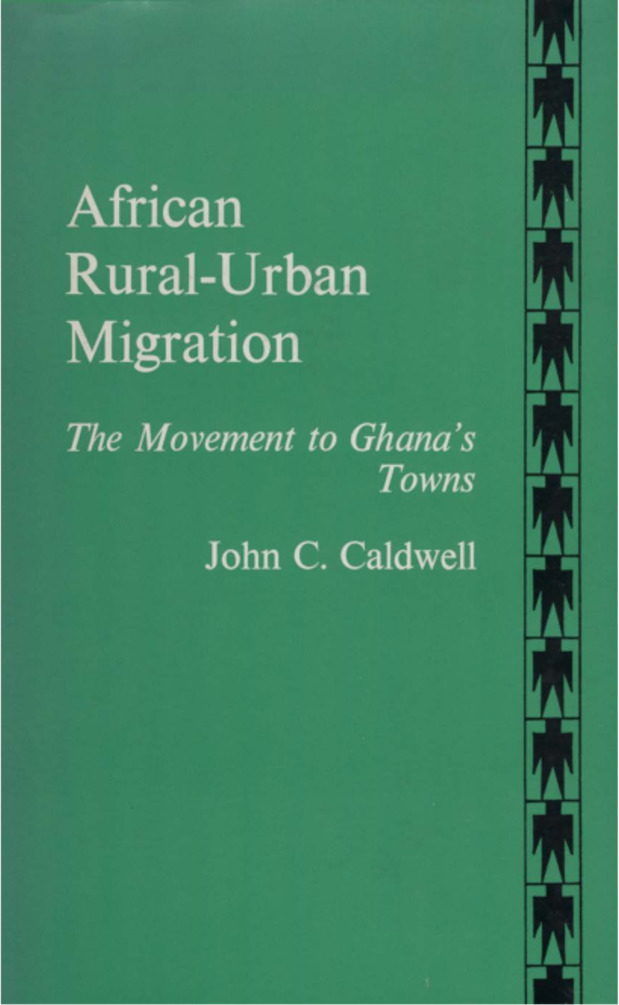
African rural-urban migration: the movement to Ghana's towns »
Publication date: 1969
In the fast-growing populations of the developing tropics, rural areas are no longer able to absorb the vast increases in their populations. In Ghana the result is striking - over a quarter of the population now lives in the towns. This book sets out to examine the kinds of people migrating to the towns, the effect of their migration on the rural areas they leave and the urban areas they adopt, their methods of travel and of solving the problems of accommodation and work, their degree of satisfaction with town life, the numbers returning to the village, and their reasons for doing so. It thus discusses whether and when a truly urban population is created. Those specialising in any branch of the social sciences, and also the layman with an interest in the way tropical African countries are developing, will welcome the information to be found here.

Opposition in a dominant-party system: a study of the Jan Sangh, the Praja Socialist Party, and the Socialist Party in Uttar Pradesh, India »
Publication date: 1969
In countries in which one political party is dominant, attention naturally centers on that party. This book is unusual because it concentrates on what were until recently the largest opposition parties in the largest Indian state. It deals with such questions as: What problems are involved in building an opposition party in a dominant-party system, particularly in a newly independent underdeveloped country? What effects do opposition parties experience when the dominant party is identified with the winning of national independence? What relationship is there between the goals of the dominant party and the activities of opposition parties? In considering these questions, Mrs. Burger offers hypotheses that can be tested in dominant-party systems outside of India. Very little has been written about the Jan Sangh, Praja Socialist, and Socialist parties in Uttar Pradesh, for until recently these were small entities in a system dominated by the Congress Party. In the Indian General Elections of 1967, however, popular support for the Congress Party declined so markedly that the three parties in question were able to form the Uttar Pradesh Government in alliance with several other parties. They are therefore opposition parties no longer. This improvement in their fortunes does not, however, affect the value of this book - and this for two reasons. For one, Mrs. Burger's main concern is with comparative, not area, politics; she has invested much time and effort in identifying factors, developing categories and constructing hypotheses that have broad relevance. The hypotheses that she has tested in Uttar Pradesh can accordingly be tested in other dominant-party systems. Moreover, because the changed political situation in Uttar Pradesh raises questions about the former minority parties and the causes for their recent rise to power, Mrs. Burger offers a close analysis of the socioeconomic political forces utilized in party building and discusses problems of party maintenance as well as providing much background information concerning the state legislators.
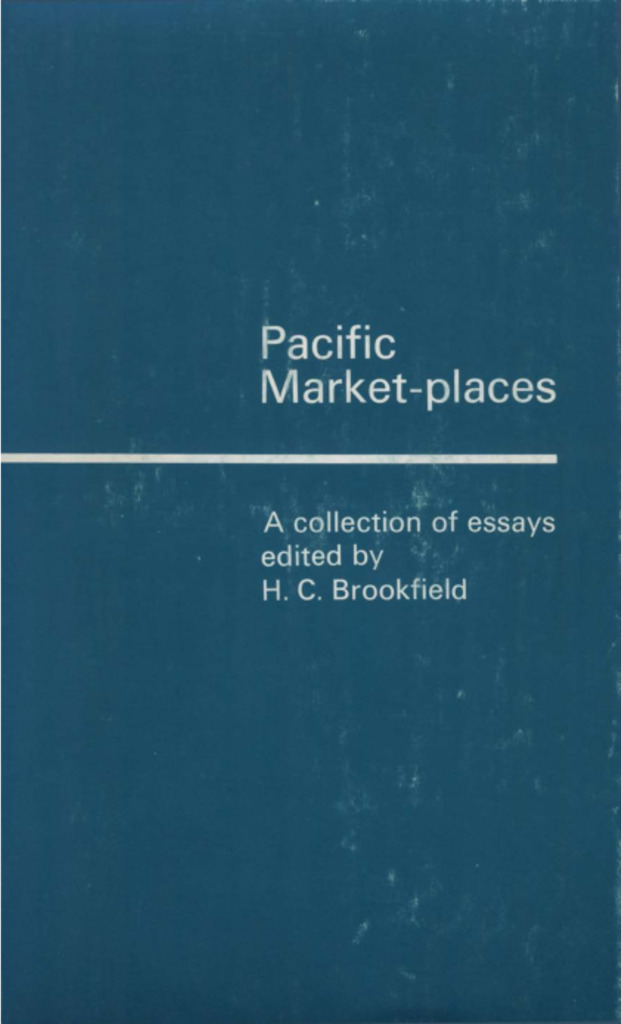
Pacific market-places: a collection of essays »
Publication date: 1969
Town and country meet and mingle in the urban produce markets of the Pacific region. From here economic forces operate to diffuse new forms of production and organisation throughout the region. These new forms are, however, superimposed on the traditional trading exchanges of the Pacific peoples; full understanding of them requires consideration of the whole social and economic environment, of trading practices and their economic motivation. This book presents a snapshot of urban marketing in the Pacific in the 1960s against such a background. The five market studies, ranging from small incipient markets in New Guinea to larger, more complex urban markets in the Solomons and Samoa, are empirical, each independently prepared. The editor draws them together with a discussion of the wider aspects of produce marketing in the Pacific, and places them within the context of a theoretical approach to urban markets in developing areas.
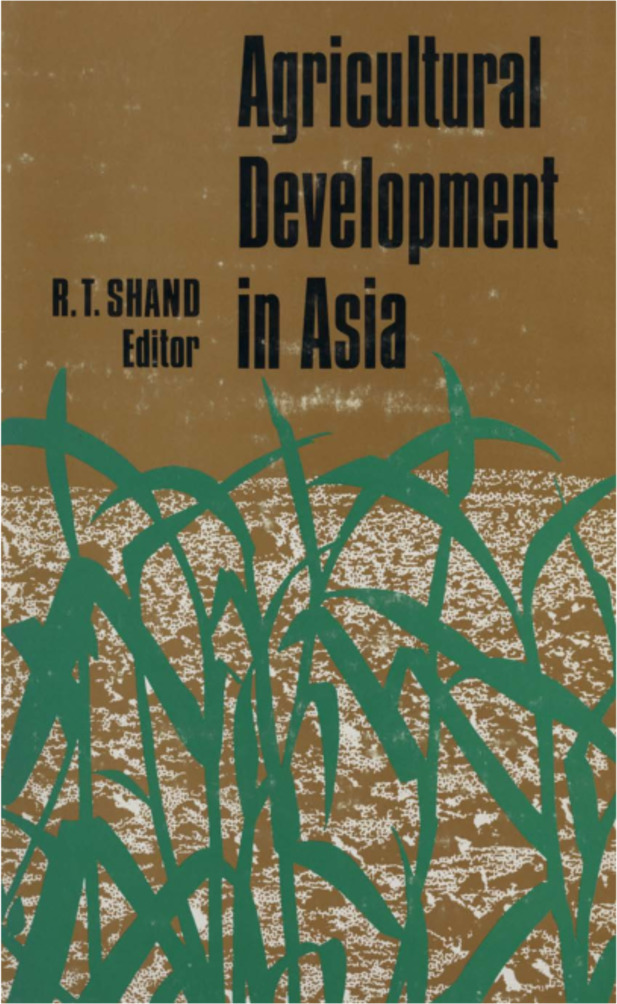
Agricultural development in Asia »
Publication date: 1969
This book comes at a critical time in the economic history of Asia. Most countries of the region, faced with burgeoning populations and a demand for higher living standards, are uncertain of their capacity to meet growing food needs and to use agriculture to initiate sustained economic development. The authors examine the problem through analyses of the agricultural development performances of nine countries within the region. What emerges is a mixture of agricultural success stories, indifferent performances, and downright failures to develop the agricultural sector. For each country a specialist author examines past and current growth rates of agricultural output, factors which have promoted and inhibited this growth, and future prospects for development. The final chapter isolates the cardinal elements in the development process and suggests ways in which these can be manipulated to promote a fast rate of growth in output. The book will interest students of agricultural development, policymakers, agricultural administrators, aid-donors, and all those who appreciate the gravity and urgency of the agricultural problems of the region.
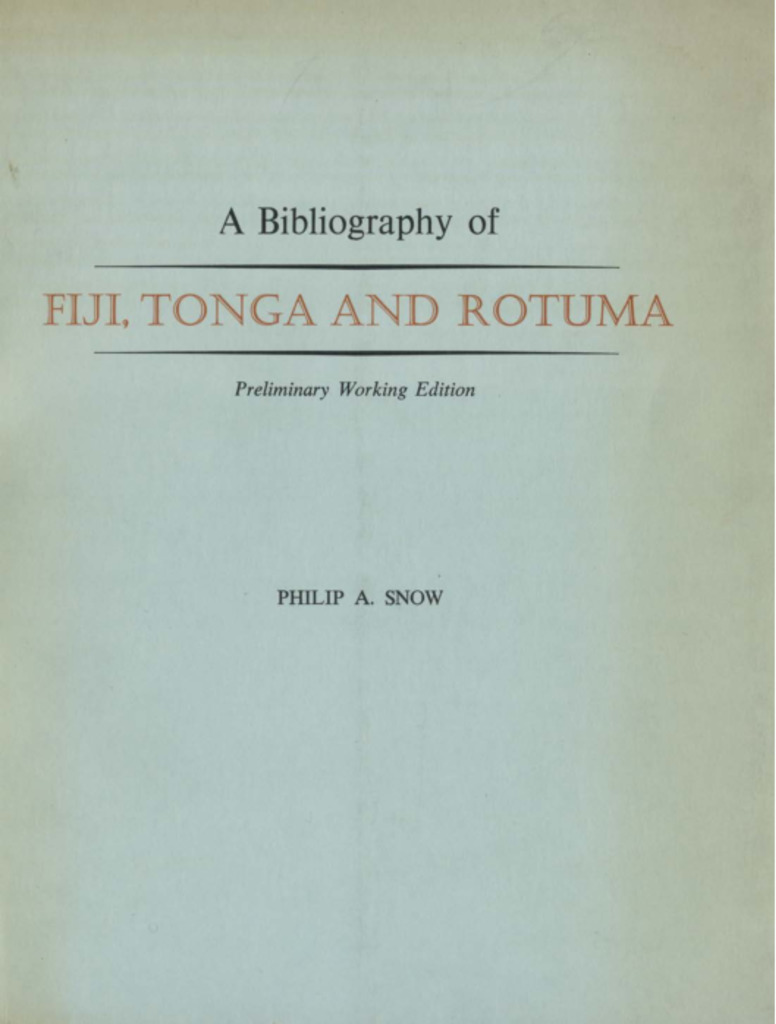
A bibliography of Fiji, Tonga and Rotuma »
Publication date: 1969
The Pacific Islands constitute an important geographical link between the civilisations of Europe and America and those of Asia. Increasingly the region is the subject of serious study in many disciplines - over the last twenty or so years, publications referring to the South Pacific exceed those of the past 300 years. Some bibliographies of different regions and selective ones for the whole area do exist; until now none has existed for the trio of territories that straddle the {u2018}dividing{u2019} line between the Melanesian western Pacific and the Polynesian eastern Pacific - Fiji, Tonga, and Rotuma. This bibliography is the result of thirty-one years{u2019} research in libraries and archives throughout the world. It consists of some 10,000 entries in distinct categories, each giving full bibliographical details, and it ranges in time from the seventeenth century to the mid-1960s. It is non-selective, for, as its author rightly says, no bibliographer knows the purposes for which his work will be used. Though this work is an essential tool for all workers in the Pacific area, the many vicissitudes it has endured - literally, it has suffered fire, flood, and war - together with its wide range in time and space, make it less than perfect. It is, therefore, published now as a preliminary working edition with the invitation that any new or emending material be sent to the author.
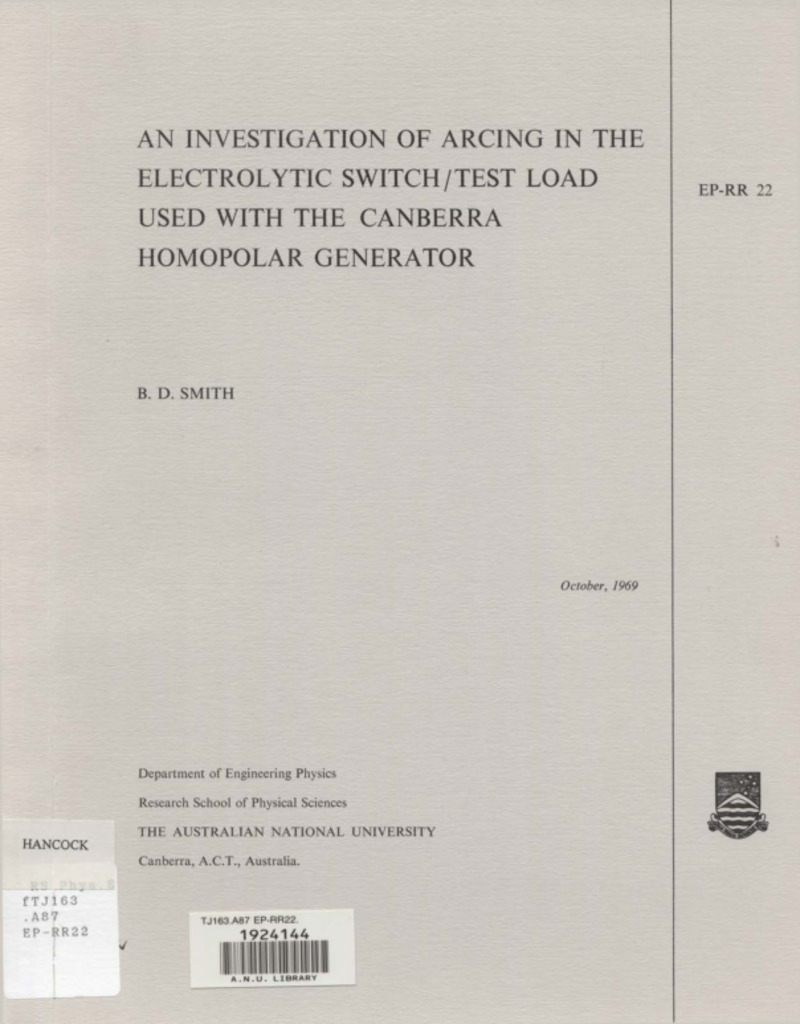
An investigation of arcing in the electrolytic switch/test load used with the Canberra homopolar generator »
Publication date: 1969
Published Press Archives http://press.anu.edu.au/node/3637 1885_114978.jpg ANU Press An investigation of arcing in the electrolytic switch/test load used with the Canberra homopolar generator Monday, 18 August, 1969 Not available Archive Scholarly Information Services Smith, B. D

Arid lands of Australia: proceedings of a symposium held in the Academy of Science, Canberra, May 1969 »
Publication date: 1969
Three-quarters of the Australian continent is arid or semi-arid. History has shown that man{u2019}s utilisation of arid lands has, in general, caused progressive deterioration of the natural vegetation, the animal resources, and finally the landscape itself. Already settlement in Australia{u2019}s arid lands bears all too evident witness to damage and degradation. Each additional use of these lands - for grazing, farming, mining - tends to distort the extremely delicate ecological balance of most of Australia. In this volume eighteen experts discuss the, often competing, uses and needs of and for the land, the abuses of it, and some possible solutions. The problem is so vast and widespread that no single state could tackle the problems, let alone tackle them successfully. Before it is too late, the problems of preserving the arid lands for present and future generations challenge the nation and the national government.

Educating for the profession of arms: current thinking and practice in Britain and the United States »
Publication date: 1969
The problems of the education of officers in the armed services are at present the subject of vigorous debate within official and service circles in Australia. To what extent do officers in the Army, the Navy and the Air Force need to be provided with a full-fledged academic education in order to fulfil their responsibilities in the modern world? How can the demands of an academic education be reconciled with those of the inculcation of soldierly virtues and skills? Should the academic part of an officer's education be imparted by military academies, or should it be undertaken by universities? Should the Army, the Navy, and the Air Force maintain separate academies, or has the time come for these to be replaced by a single, multi-service academy? Professor P. H. Partridge recently had occasion to examine recent thought and practice concerning military education in Britain and the United States. Here he gives an account of his impressions and reflects about some of the major questions.

The strategy of General Giap since 1964 »
Publication date: 1969
Published Press Archives http://press.anu.edu.au/node/3601 1885_115099.jpg ANU Press The strategy of General Giap since 1964 Monday, 18 August, 1969 Not available Archive Scholarly Information Services O'Neill, Robert John
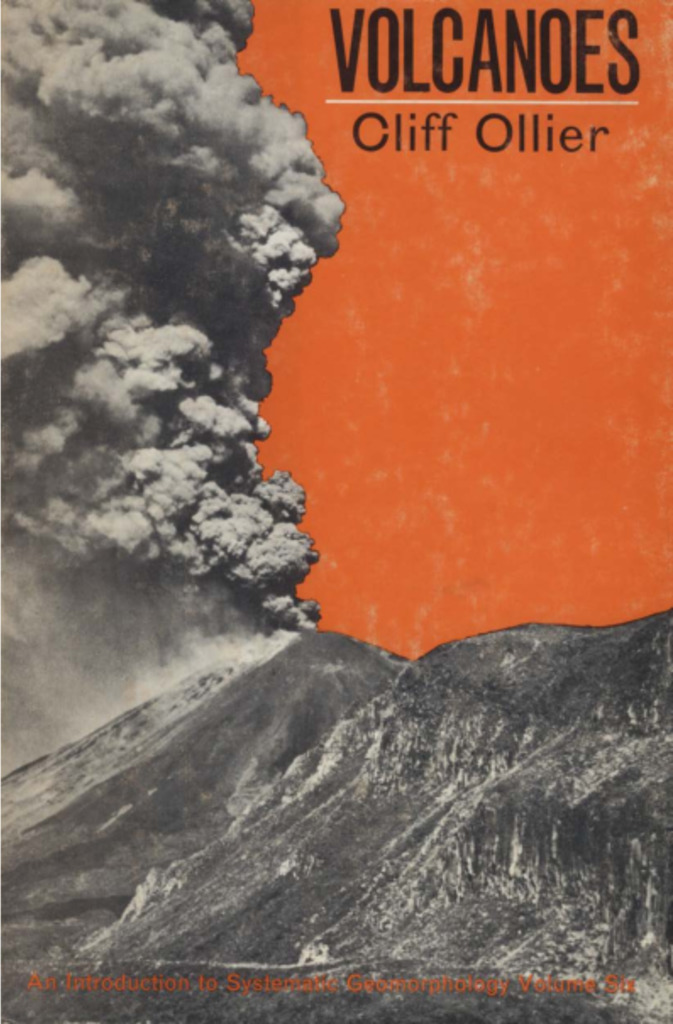
Volcanoes »
Publication date: 1969
Volcanic eruption is the most spectacular of all landscape-forming processes, and has a fascination for the scientist and the ordinary man alike. This book gives an up-to-date account of the mechanism of volcanic activity, the products of eruption, and especially the many varieties of landform produced by vulcanism. It also describes the processes of weathering and erosion that attack volcanoes and lava flows, and discusses the course of landscape evolution in volcanic areas. The numerous examples of eruptions, disasters, landforms, and scientific investigations are drawn from all over the world, with some emphasis on volcanic features of Australasia. The distribution of volcanoes is explained in conjunction with modern ideas of the evolution of the earth's crust, and the final chapter discusses methods used to predict eruptions as well as what to do when an eruption occurs. Volcanoes is aimed at the level of undergraduate geomorphology students, but will be of interest to geologists, geophysicists, and hydrologists. It is also a suitable introduction to volcanoes for schools and for the general reader. Like other volumes of the Introduction to Systematic Geomorphology series it is well illustrated with diagrams and photographs.

The 1968 Federal redistribution »
Publication date: 1969
During 1968 a massive reshuffling of electoral boundaries took place, the first for thirteen years. The redistribution reflects the changes in population that have occurred in those years: in the New Parliament to be elected in 1969 New South Wales has one seat less and South Australia and Victoria each one more; new seats have been created and old ones abolished; only five constituencies remain unchanged. Past electoral figures are thus unreliable, a deficiency this work overcomes by adjusting previous election figures to the new boundaries for all seats, as well as summarizing the extent of alterations, creations, and abolitions. It also contains twelve useful electoral maps, and a most instructive index of representativeness. It is an essential guide for the 1969 federal election.



